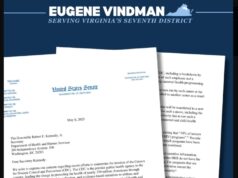“Canvassing” in politi-speak means physically walking a neighborhood, knocking on the doors of residences, and, one hopes, talking to a likely voter who answers the door. That is what I’ve been doing in Northern Virginia lately on behalf of President Obama’s Organizing for America. This is what political junkies refer to as “the ground game,” and it is hoped that the Democratic ground game will offset the money game of the other side, which utilizes thundering gushers of Super-PAC millions. I spent most of a recent Saturday and Sunday canvassing a generally average middle-class suburban neighborhood of detached homes, in this case in the City of Fairfax, where my real estate office is, and where I’ve sold many homes over the years, so I know the area. I did not simply go up and down the street to every house because I was provided with a list of targeted names and addresses based on some selection system that supposedly winnowed out strong Republicans, leaving a list of voters who had given some indication in the past they might be inclined to support Obama this year; I think the list was compiled out of Chicago (or maybe Richmond), based on computer records. It was not, in other words, to be a cold-call list, but a warm-call list. What did I experience, and is it typical?
First of all, many people either were not at home, or refused to answer the door even though the door was open with screen door locked, and the car was in the driveway—- I’d knock twice, wait, and leave an Obama brochure (which, by the way, is very good, readable, and non-gimmicky). It reminded me of a comedy show where stressed folks hide in the closet to avoid a boring relative who always wants to borrow money. Given OFA’s dogged persistence, I am sure the not-at-homes will be re-contacted repeatedly over the coming weeks, but already I am getting the message: folks, even before September-October, act as though they are utterly sick of politics in general, and occupied by personal concerns… a kind of voter suppression in itself. I saw a few Romney yard signs, even though it was pre-convention, and no Obama yard signs but several Obama bumper stickers from ’08 or the new 2012 ones.
What surprised me was the number of people on the list who, when asked if they intended to vote for President Obama in November, said “No!”, sometimes after admitting they had done so in ’08. Just how was this list selected, I wondered, especially when, recognizing some of the names, I was pretty sure they were Republicans anyway…. Maybe in the past they split ticket, regularly voting Republican, but also supporting our local State Senator Chap Petersen, who is a moderate Democrat, and maybe that’s how they got on the OFA list? Despite this glitch I did discover a fair percentage who were Obama supporters, or leaning Obama, but far too often they sounded resigned, more worried about Tea Party Republicanism than inspired by Obama.
Very often the person on my list was not at home. Some were already at college, some napping or working, and a few no longer lived there or were deceased—- the lists, in other words, were definitely not up-to-date). Several times the spouse (usually the wife) of the person I sought answered the door—- and, said things like: “Oh, he is for Obama but I’m not. We disagree.” Where was the vaunted gender gap? Here are some words or phrases I often heard:
Disappointed: I heard this more than a few times, even when the respondent finally said they were “leaning” Obama; they wondered “Where’s the change?” “Where’s the recovery?” Some were then receptive, and some were not, to a discussion about Obama’s really substantive accomplishments.
Anti-religion: this came exclusively from anti-Obama voters; values voting is still strong, and it was linked not only to abortion but also to Obama’s gingerly compromise with the Catholic hospitals on contraception; one Hispanic woman was strongly anti-Obama because her bishop told her—- telling her that Catholic nuns were in favor of Obamacare did not overcome the bishop (she is originally from Paraguay, a notably authoritarian country).
Socialist/communist/Marxist/un-American: used interchangeably; I am beginning to think they’re code words for “he’s a black guy;” Obama and the Democrats are accused angrily of trying to turn America into a European socialist state.
Government take-over of health care: often linked with the socialism charge, coupled with an adamant statement that Obamacare was making health care more expensive and adding to the deficit; occasionally the mandate specifically was excoriated; I was a little surprised I did not hear about “death panels,” but I doubt that lie has disappeared (it’s probably gone underground).
Entitlements/Taxes/Deficit: almost always a packaged complaint that Obama was “destroying America” with out-of-control spending , often said with a strong hint of an anti-welfare, anti-minorities, anti-immigrant subtext; it was not specifically about the “fiscal cliff,” or the debt-deal Obama and Boehner almost made, nor upcoming sequestration, nor Simpson-Bowles—- no one was that knowledgeable, but they had the general Republican talking point about Big Government and Big Spending down pat.
When we happen upon a strong Republican, the protocol is to say “Thank you for your time, have a nice day, good-bye,” but I met two such women who insisted on delivering extended rants which I found to be a fascinating insight into the dedicated Republican mind. This was before the Republican convention, but they pretty much covered its entire platform, from abortion to teachers to unions, even Solyndra and “that pipeline Obama wouldn’t approve.” The GOP has done a remarkable job of instilling its propaganda as one big, tightly linked philosophical glob.
What I found unsettling was the unbelievably deep desire to punish, to hurt “the others” (which proved to be anybody from sluts, to lazy minorities, welfare queens, unions, teachers, federal bureaucrats, big-spending Democrats—- but never Wall Street financiers). “If Obama wins, this country is done for, and we’ll have to do something to stop it,” a statement so desperate I think it was almost a declaration of war. The Republicans’ four-year hate fest has sown a whirlwind; even if the party leadership wanted to tone it down, I don’t believe they could.
On the other hand, there were some enthusiastic Obama supporters, who said their whole family is voting for Obama; these people generally understood that Obama inherited such a godawful mess and faced so much obstruction from the Congressional Republicans that he has not been able to get done all that he promised to do. This is Northern Virginia, after all, next door to Washington, and if any population has had a front row seat on what’s really going on in Congress, it would be this population—- but, unhappily, such knowledgeable voters were few and far between, even here. One lean-Obama voter did say to me, “President Obama never explained what was going on, he waited too long,” and this led to a good discussion of political realities. I was also told I was the first Obama contact they’d had.
He has a point. While governing and campaigning are two different things, it is clear that Obama should have spent more time talking to the American people over the past four years about what was going on as he attempted to work with Congress and the Republicans, instead of concentrating so exclusively on trying to cut deals. His absence allowed the Republicans to frame the narrative, and now it is an uphill battle to get the Democratic message across. Maybe it was just the neighborhood I was canvassing, but, even among pro-Obama voters I found that most of the issues were framed in Republican terms and terminology.
Obama has, finally, begun aggressively to define the political choice more clearly (I personally would prefer an even sharper definition), but time is short. Another consequence of his late counter-attack is a general ignorance about how much Republican obstructionism frustrated Obama’s efforts to bring meaningful change, or to re-start the economy. The tendency, even among pro-Obama supporters, is often to blame both parties in Congress for the gridlock. Even if he wins handily in November, if he does not have a Democratic House and Senate, he will have another four years just like the past two. The Obama campaign needs to do a better job in explaining why down-ballot races are important. Not one respondent mentioned this on their own.














